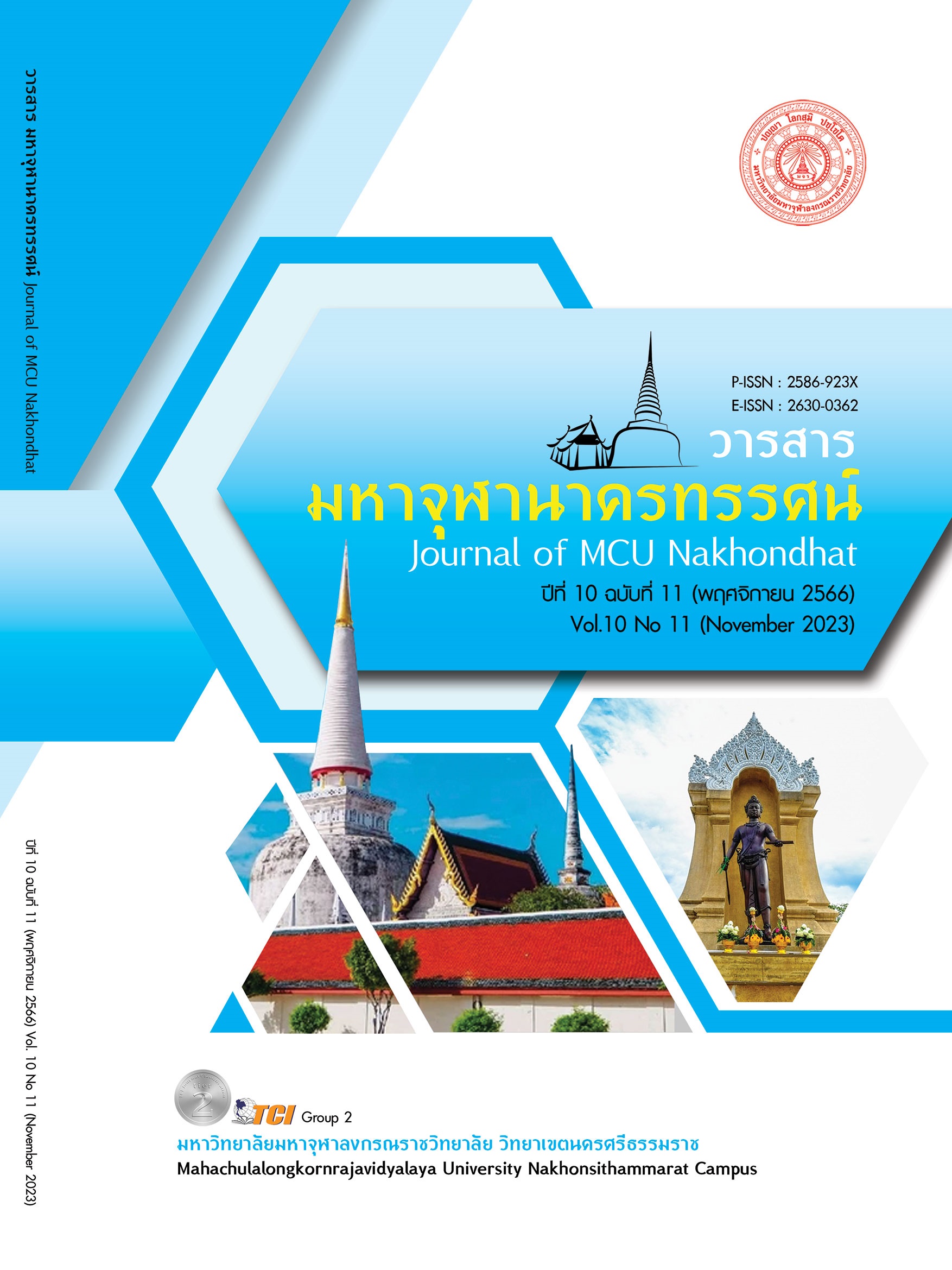CHLLENGES IN THE IMPLEMENT OF THE NEW NARCOTIC DRUG LAWS : IN ACCORDANCE WITH THE NARCOTIC DRUGACT, B.E. 2564
Main Article Content
Abstract
Drug addiction is a pervasive societal problem at one level or another in nearly every country globally. In Thailand, the issue of drug addiction is a cause for concern, with the accumulation leading to adverse effects and consequences for society at all levels, starting from the family level to the community level and extending to the national level for an extended period. It is imperative that earnest efforts be made by individuals associated with every organization to address and rectify this issue. Hence, it can be seen that drug addiction is a serious societal problem at the national level because every society is impacted by this issue. This includes the spread of drug addiction in Thai society, despite preventive measures and efforts to crack down on both clandestine distributors and users. However, the problem cannot be completely eradicated and rectified due to its intricate nature. Moreover, the prolonged existence of this issue has intensified its severity over time. On November 8, 2021, the Royal Gazette published new drug-related legislation, comprising two acts: the Narcotics Act (No. 2) B.E. 2564 and the Act on the Adjudication of Drug Cases (No. 2) B.E. 2564. These laws, which came into effect on November 9, 2021, consist of 24 sections and focus on the compilation of drug laws and the procedures for considering drug cases under the Narcotics Act B.E. 2564. Notably, certain observations arise from this legislation as it emphasizes viewing drug users as patients, advocating for rehabilitation instead of punishment. Nevertheless, the practical implementation of this approach remains unclear due to the absence of subsidiary laws. Therefore, the enforcement of the existing laws raises questions about whether it truly aligns with this mindset or, in other words, whether the actual practice of sending drug users for rehabilitation is occurring. The reduction of penalties may lead to concerns regarding the activities of drug dealers and users. Consequently, it is evident that the enactment of these laws has significantly favored the interests of the offenders, inducing a diminished fear of the law.
Article Details

This work is licensed under a Creative Commons Attribution-NonCommercial-NoDerivatives 4.0 International License.
References
กรมราชทัณฑ์. (2566). รายงานสถิติผู้ต้องราชทัณฑ์คดี พ.ร.บ. ยาเสพติดทั่วประเทศ. เรียกใช้เมื่อ 6 เมษายน 2566 จาก http://www.correct.go.th
กอบกูล จันทวโร. (2546). กฎหมายระหว่างประเทศที่เกี่ยวกับยาเสพติด : ในมิติของการปราบปรามการลักลอบค้ายาเสพติดทางทะเล. เรียกใช้เมื่อ 17 เมษายน 2566 จาก http://elib.coj.go.th/Article/drug1.pdf.
เกียรติก้อง หนูจันทร์. (16 พฤษภาคม 2566). การพิจารณาความผิดของผู้กระทำผิด. (นางสาวภิญญาพัชญ์ เห็นประเสริฐ, ผู้สัมภาษณ์)
จักรกฤษ บุญหรอ. (4 พฤษภาคม 2566). การใช้ดุลพินิจในการดำเนินคดี. (น นางสาวภิญญาพัชญ์ เห็นประเสริฐ, ผู้สัมภาษณ์)
ฉัตรสุมน พฤฒิภิญโญ. (2560). กฎหมายควบคุมยาเสพติดเปรียบเทียบ. วารสารกฎหมายสุขภาพและสาธารณสุข, 3(2), 148 - 164.
ชนะชัย ลิ้มโอภาส. (15 เมษายน 2566). ความสำคัญของการปราบปรามและบังคับใช้กฎหมายยาเสพติดในประเทศไทยปัจจุบัน. (นางสาวภิญญาพัชญ์ เห็นประเสริฐ, ผู้สัมภาษณ์)
นนทชัย นพรัตน์. (10 พฤษภาคม 2566). การใช้ดุลพินิจในการสืบสวน. (นางสาวภิญญาพัชญ์ เห็นประเสริฐ, ผู้สัมภาษณ์)
นพพร แซ่ภู่. (15 พฤษภาคม 2566). ปัญหาของสถานที่บำบัดฟื้นฟู. (นางสาวภิญญาพัชญ์ เห็นประเสริฐ, ผู้สัมภาษณ์)
บัณฑิตย์ สุขะวิศิษฐ์. (10 พฤษภาคม 2566). ปัญหาในการวางแผนจับกุมผู้ค้ายาเสพติด. (นางสาวภิญญาพัชญ์ เห็นประเสริฐ, ผู้สัมภาษณ์)
ปรุฬห์ชัย เหมกัง. (16 พฤษภาคม 2566). กฎหมายใหม่จะช่วยลดจำนวนนักโทษได้หรือไม่. (นางสาวภิญญาพัชญ์ เห็นประเสริฐ, ผู้สัมภาษณ์)
พจน์ ยอดพิจิตร. (10 เมษายน 2566). การยึดทรัพย์สินคดียาเสพติดและการใช้สถานที่บำบัดฟื้นฟู. (นางสาวภิญญาพัชญ์ เห็นประเสริฐ, ผู้สัมภาษณ์)
พรพจน์ เทพทอง. (13 พฤษภาคม 2566). ช่องว่างของกฎหมายที่เกี่ยวข้องกับการป้องกันและปราบปรามยาเสพติด. (นางสาวภิญญาพัชญ์ เห็นประเสริฐ, ผู้สัมภาษณ์)
พระราชบัญญัติประมวลกฎหมายอาญา พ.ศ. 2499 (ฉบับพิเศษ). (2499). ราชกิจจานุเบกษา เล่ม 73 ตอนที่ 95 หน้า 1 (13 พฤศจิกายน 2499).
พระราชบัญญัติยาเสพติดให้โทษ พ.ศ. 2522 (ฉบับพิเศษ). (2522). ราชกิจจานุเบกษา เล่ม 96 ตอนที่ 63 หน้า 40 (22 เมษายน 2522).
พระราชบัญญัติวิธีพิจารณาคดียาเสพติด พ.ศ. 2564 (ฉบับที่ 2). (2564). ราชกิจจานุเบกษา เล่ม 138 ตอนที่ 73 ก หน้า 81 (7 พฤศจิกายน 2564).
ภูรินทร์ เพชรที่วัง. (20 เมษายน 2566). ภาพรวมของปัญหาที่เกิดขึ้นตั้งแต่ประกาศใช้กฎหมายยาเสพติดฉบับใหม่. (นางสาวภิญญาพัชญ์ เห็นประเสริฐ, ผู้สัมภาษณ์)
ภูวิชชชญา เหลืองธีรกุล. (2565). กฎหมายยาเสพติดใหม่: 8 เดือนของการบังคับใช้ในภาวะที่ยังไร้กฎหมายลูก กับ ภูวิชชชญา เหลืองธีรกุล. เรียกใช้เมื่อ 20 เมษายน 2566 จาก https://www.the101.world/eight-months-new-narcotic-bills/.
วีระญา คชบริรักษ์. (11 เมษายน 2566). ปัญหาของสถานที่บำบัดฟื้นฟู. (นางสาวภิญญาพัชญ์ เห็นประเสริฐ, ผู้สัมภาษณ์)
วีระศักดิ์ มะลิทอง. (12 พฤษภาคม 2566). แนวทางการฟ้องและดำเนินคดีกับผู้ทำผิด. (นางสาวภิญญาพัชญ์ เห็นประเสริฐ, ผู้สัมภาษณ์)
สังศิต พิริยะรังสรรค์. (2563). ต้นทุนทางด้านเศรษฐกิจและสังคมของนโยบายปราบปรามยาเสพติดของไทย. วารสารนวัตกรรมสังคม, 3(1), 21 - 44.
สุวนัย ตุลยภักดิ์. (8 เมษายน 2566). ผลของการเปลี่ยนแปลงอัตราโทษ. (นางสาวภิญญาพัชญ์ เห็นประเสริฐ, ผู้สัมภาษณ์)
สุวัฒน์ พรหมขุนทอง. (9 พฤษภาคม 2566). ผลของการเปลี่ยนแปลงอัตราโทษ. (นางสาวภิญญาพัชญ์ เห็นประเสริฐ, ผู้สัมภาษณ์)
สุวิทย์ ครุครรชิต. (10 เมษายน 2566). ช่องว่างของกฎหมายที่เกี่ยวข้องกับการป้องกันและปราบปรามยาเสพติด. (นางสาวภิญญาพัชญ์ เห็นประเสริฐ, ผู้สัมภาษณ์)


